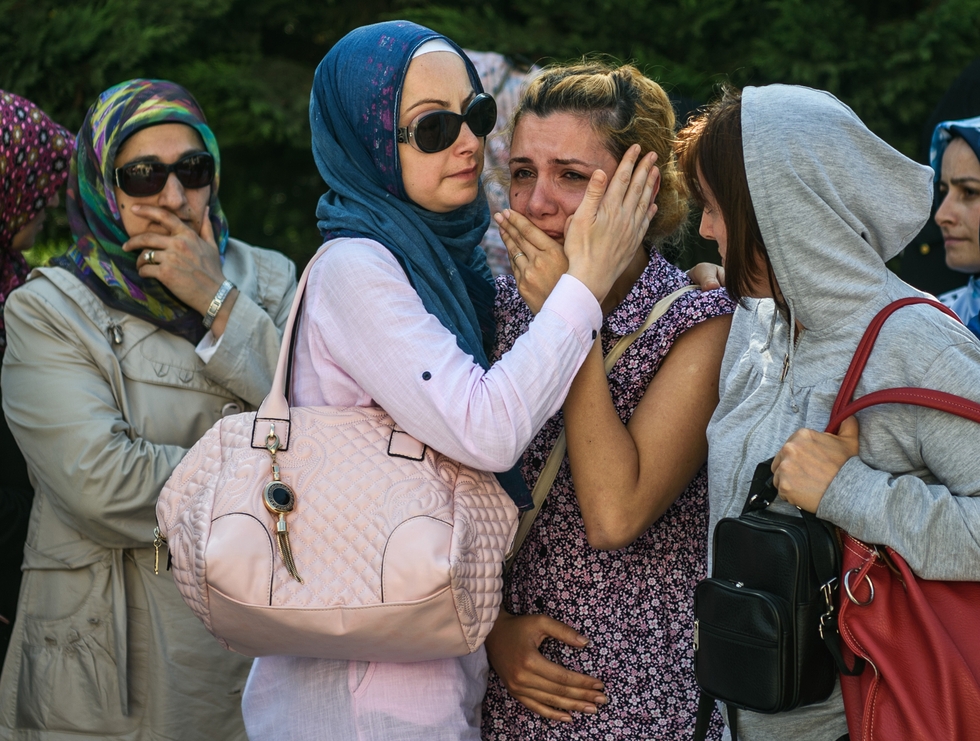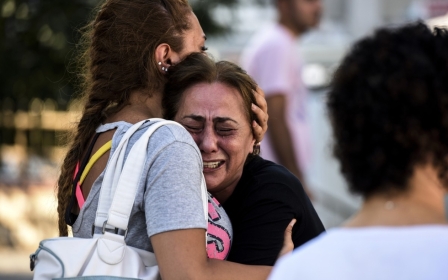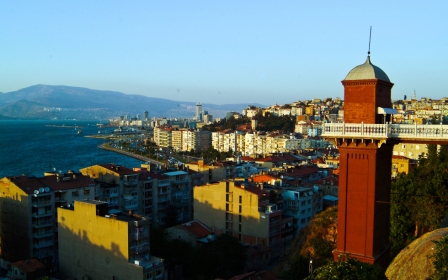Anger, confusion, defiance: Turkey faces up to Ataturk attack

ISTANBUL, Turkey – Murat Kaya’s body language says everything. Anger in his eyes, confusion in the shrug of his shoulders and resignation in his slump.
A spate of terrorist attacks in the country during the past year has left people bewildered and unable to understand quite what they feel.
“I don’t know what to say. I don’t even care anymore. God damn them all,” was Kaya’s first response to Tuesday’s deadly attack in Istanbul's Ataturk airport, where dozens were killed in suicide attacks blamed on the Islamic State (IS) group.
It is almost as if a fatalistic nonchalance had taken hold as the airport was back operating at near full capacity less than 12 hours later. On Wednesday morning, roads around the airport were clogged with traffic as usual.
In contrast, Brussels airport remained shut for about two weeks following a similar attack there on 22 March.
Other often-crowded areas of the city, such as the tourist-heavy Taksim and Kadikoy squares, were deserted, however.
Kaya, who has been selling Simit, a bagel-like snack, for the last eight years in Taksim, told Middle East Eye he is facing one of the toughest business periods since the Gezi protests here three years ago.
“I don’t fear their bombs. What I fear is that my children will go hungry,” Kaya said.
Ataturk was the seventh major attack in Turkey since last July. Many groups have claimed or been held responsible for the slaughter - IS, the Kurdistan Workers’ Party, al-Qaeda affiliates. Turks feel attacked from all sides, and are hurting.
Mahmut Dagdelen, owner of a tourism company in Taksim, told MEE he had hoped for an upswing in business for the Eid holidays, but that has been dashed.
“A group from Kuwait cancelled their reservation last night. They sent me images of the airport blast and said, ‘How do you expect us to come?’,” Dagdelen said. “There is nothing else I can do other than pray for a miracle now.”
Yet a sense of defiance and desire to not succumb to such attacks bubbles below the surface.
“It has reached a point where I can’t even afford to feed my family. It is not the bombs I am afraid of anymore. We had one right here on Istiklal Street recently,” Kaya said.
“They are trying to starve us or kill us outright. We cannot let them succeed,” he said.
Condition of the Turkish tourism industry has become a bellwether for stability and prospects of the country
The symbolism of Tuesday’s attack on the country’s main airport, which is heavily guarded, has made people even more nervous.
The condition of the Turkish tourism industry has become a bellwether for stability and prospects of the country.
Already battered as a result of the direct and indirect spillovers from the Syrian conflict, this attack may leave the industry crippled for the foreseeable future.
Although tourism accounts for just around 3.5 percent of Turkey’s roughly $800bn annual economy, its labour-intensive nature means it provides employment opportunities for almost two million people.
Resid, a waiter at a cafe on the Asian side of the city, said bomb attacks translate instantly into a loss of income.
“On top of that, because of their fear of IS, people are afraid to frequent places that serve alcohol during Ramadan. Every attack fills us with apprehension. We are working in places that are primary targets for such people.”
For foreigners in Turkey, the feelings are similar.
Rob McArthur, a junior doctor from the UK who is doing an elective course at an Istanbul hospital, said the scale and location the latest attack worried him, but he does not plan to cut short his stay in the country.
“I felt disgusted and sick when I heard about it, but my emotions are directed at the perpetrators, not at this country,” McArthur said.
“I knew the situation when I came two months ago. You try to be sensible and avoid political gatherings and those kinds of crowded places. But it really is no different from anywhere else. I still walk along the city’s main streets and continue to live normally.”
Like most analysts, McArthur agrees that the timing of the attack will deal a severe blow to the stagnant tourism industry. Still, he will not hesitate to recommend to his friends that they visit Turkey.
“I fear this will kill tourism numbers for next year as well. It is inevitable that people will put off travelling to Turkey.”
Turkey just embarked on repairing its ties with Russia and Israel.
A huge portion of the tourism industry’s recent woes have stemmed from a loss of Russian tourists amid the severing of diplomatic ties with Moscow after the downing of a Russian bomber by a Turkish jet. And strained ties with other regional countries, including Israel, have not helped create a positive and stable image of the country.
“I hope we will be able to restore Turkey’s image as a safe country at some point,” Dagdelen said.
New MEE newsletter: Jerusalem Dispatch
Sign up to get the latest insights and analysis on Israel-Palestine, alongside Turkey Unpacked and other MEE newsletters
Middle East Eye delivers independent and unrivalled coverage and analysis of the Middle East, North Africa and beyond. To learn more about republishing this content and the associated fees, please fill out this form. More about MEE can be found here.




